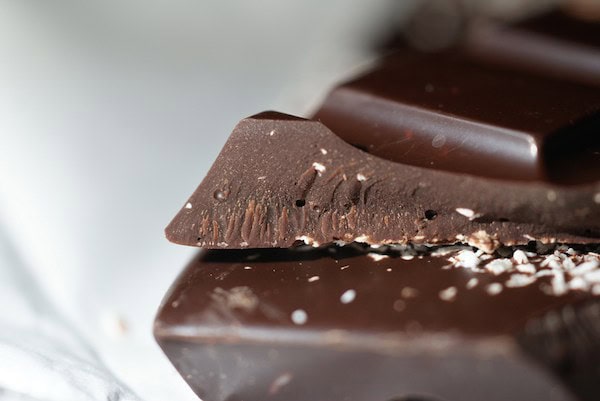
[Image above] Credit: Lee McCoy, Flickr (CC BY-ND 2.0)
In the back and forth battle of good-for-you/bad-for-you foods, new research is helping to solidify dark chocolate’s spot with the good guys, by providing a scientific explanation for cocoa’s tick in the pros column.
While a host of previous research has suggested an equal host of health benefits to dark chocolate consumption, including lower blood pressure and decreased body weight, researchers didn’t know just how chocolate achieved those feats.
(In addition to its health benefits, “welded” chocolate can also help teach science—maybe it will show up at the Superbowl of STEM next month.)
But new research conducted at Louisiana State University and presented at the recent American Chemical Society annual meeting tested what happened to cocoa powder when processed in the laboratory by a mock human digestive system—complete with a mimicked gut and a colon colonized with bacteria from human stool samples (which lead researcher John Finley tells NPR came from mostly graduate students paid $20). The results suggest that you can thank those bacteria for making chocolate good for you.
The research is part of a exploding field dedicated to determining how the microbes that call us home, collectively termed the human microbiome, impact our lives—while we once thought the relationship between us and our some trillion bacteria was commensal (i.e., they benefit and we are unaffected), tons of new research, including the government-funded Human Microbiome Project, suggests the relationship is instead symbiotic (i.e., we both benefit). Watch the four-minute-long Youreka Science video below to learn more about the gut microbiome and how it affects your health.
(See this infographic from a NY Times article by science writer Carl Zimmer to get an idea of the impressive, albeit overwhelming, diversity of bacteria found on our bodies. And check out American Gut to become part of the experiment.)

Youreka Science makes sense of the gut microbiome and how it affects your health. Credit: YourekaScience, Youtube
In the emerging image of our microbiome affecting virtually every other aspect of our health and biology, it seems the symbiosis doesn’t stop at what we eat. So back to the chocolatey good stuff—cocoa contains polyphenols, a kind of antioxidant that has been long purported to have its own range of health benefits. Lots of other foods contain polyphenols, but cocoa specifically is packed with a type called flavanols.

Up close and personal with E. coli bacteria. Credit: NIAID, Flickr (CC BY 2.0)
Because polyphenols are not well digested or absorbed by your digestive tract, the new research suggests it is the microbes that add a polyphenol-busting punch. And, just like the characters of any epic movie plot, your gut bacteria also draw a line between good and evil, with bugs like Bifidobacteria and lactic acid bacteria on the good side and Clostridia and E. coli on the bad side, according to the press release.
Although bad bacteria can be blamed for gas and other bathroom issues, good bacteria in the colon ferment cocoa’s polyphenols into smaller molecules that can more easily enter the bloodstream and exert their anti-inflammatory effects. And, as an added bonus, cocoa also contains fiber that bacteria break down into short-chain fatty acids to make you feel more full.
The press release adds that “combining the fiber in cocoa with prebiotics is likely to improve a person’s overall health and help convert polyphenolics in the stomach into anti-inflammatory compounds. …Prebiotics are carbohydrates found in foods like raw garlic and cooked whole wheat flour that humans can’t digest but that good bacteria like to eat.”
I don’t know about you, but I just read that like a menu—garlic and cooked whole flour sounds to me like a good Italian dinner. But save some room for a dessert of dark chocolate and wine—you know, for your health.
Whereas prebiotics feed the good bacteria, probiotics are the good bacteria themselves and can be found in certain foods or in supplement pills. I’ve conducted unofficial experiments in my own home and can definitely attest to the benefits of probiotics if you don’t already have a robust colony of “good” bacteria. USA Today even touts the perks of probiotics, although to be fair, more comprehensive (and official) research studies are needed.
And although your gut bacteria are relatively stable, extreme changes in diet can alter the composition of your critter colony, indicating that manipulation of gut microbes may someday (soon) be used to treat various gut-related health concerns.

Chocolate’s health benefits are stacking up. Credit: cacaobug, Flickr (CC BY-NC-ND 2.0)
But we should be clear—the research attributed the potential health benefits to cocoa, which is just one component of chocolate. In fact, new research is underway to test the potential health benefits of pure cocoa in pill form.
Chocolate also contains sugar and fats along with the cocoa to produce that rich, velvety, melt-in-your mouth consistency. Dark chocolate contains the most cocoa, while milk chocolate contains less cocoa and adds another obvious ingredient. White chocolate, you may have guessed from its color, contains no cocoa.
But before you put down the chocolate and pick up the cocoa powder, LSU researchers next will move their studies out of the laboratory and into real human digestive systems to ensure the results hold up in the much more complex system of the human body. We’ll have to wait for those results to identify the best way to maximize cocoa’s health benefits. We may find that the story is similar to that of another antioxidant rich in tomatoes, lycopene, which research has shown is best absorbed when combined with fat.
While we love proof, perhaps it’s no surprise that chocolate has positive health benefits—after all, it has been part of our society for thousands of years. Almost a decade ago, scientists discovered chocolate residue on a Mayan ceramic teapot-like vessel that was dated to around 500 B.C. And just last year, new analyses suggested that date be moved back by about another thousand years after chemical traces of chocolate were found on even older pottery from the American Southwest.
Regardless of how old it is or precisely how it achieves its health benefits, chocolate definitely has the feel-good-factor—so with Easter fast approaching, just don’t forget to thank your microbiome as you guiltlessly chomp off the ears of that dark chocolate bunny.
Author
April Gocha
CTT Categories
- Basic Science
- Weekly Column: “Other materials”

